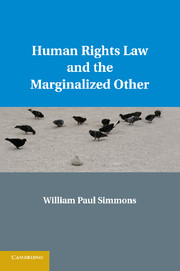Book contents
- Frontmatter
- Brief Contents
- Contents
- Preface
- Introduction
- Part I Deconstruction of Human Rights Law
- Part II Phenomenology of the Saturated Other
- 3 Derrida, Levinas, and the Rights of the Other
- 4 The Saturated Other
- Part III Human Rights of the Marginalized Other
- Conclusion Working with the Marginalized Other to Deconstruct and Reinvigorate Human Rights Law
- Bibliography
- Index
3 - Derrida, Levinas, and the Rights of the Other
from Part II - Phenomenology of the Saturated Other
Published online by Cambridge University Press: 07 October 2011
- Frontmatter
- Brief Contents
- Contents
- Preface
- Introduction
- Part I Deconstruction of Human Rights Law
- Part II Phenomenology of the Saturated Other
- 3 Derrida, Levinas, and the Rights of the Other
- 4 The Saturated Other
- Part III Human Rights of the Marginalized Other
- Conclusion Working with the Marginalized Other to Deconstruct and Reinvigorate Human Rights Law
- Bibliography
- Index
Summary
The previous two chapters outlined the concrete universalisms found in Hannah Arendt’s and Seyla Benhabib’s writings. Whereas they offer important theoretical frameworks for understanding judgment and democracy, the examples of the Little Rock crisis and l’affaire du foulard illustrate that such concrete universalisms with their reliance on un-interrogated typologies have a tendency to cauterize the Other and thus must be subject to a continuous deconstruction. The two chapters of Part II will use the writings of Derrida, Emmanuel Levinas, Jean-Luc Marion, and Enrique Dussel to develop a concrete universalism founded in the encounter with the Marginalized Other. Their philosophies of the Other share the same basic structure; the Other is transcendent to politics, ontology, and law, and thus is in a position to question all typologies as well as democracy, human rights, and even the pronouncements of the Arendtian judge. Nevertheless, their ultimate conceptions of the Other vary widely. Derrida’s phenomenology relies much more on a “pure” transcendence, whereas Levinas’ and especially Dussel’s works seek transcendence in the concrete marginalized Other human person.
This chapter begins by exploring Derrida’s and Levinas’ conceptions of the Other. I argue that Derrida’s conception of the tout autre relies too much on an abstract or “desertified” (Kearney 1999) account of the Other and thus has an asymptotic relationship with immanence; that is, transcendence approaches but never quite intersects with immanence. Levinas’ conception of the Other much more clearly refers to the concrete marginalized human Other, but, as we shall see, his writings provide only a modicum of normativity. This becomes clear in the concluding section of the chapter that compares the writings of Levinas and Arendt on human rights and crimes against humanity, including Levinas’ infamous interview discussing the massacre of Palestinians at the Sabra and Chatila refugee camps in 1982.
- Type
- Chapter
- Information
- Human Rights Law and the Marginalized Other , pp. 85 - 106Publisher: Cambridge University PressPrint publication year: 2011



